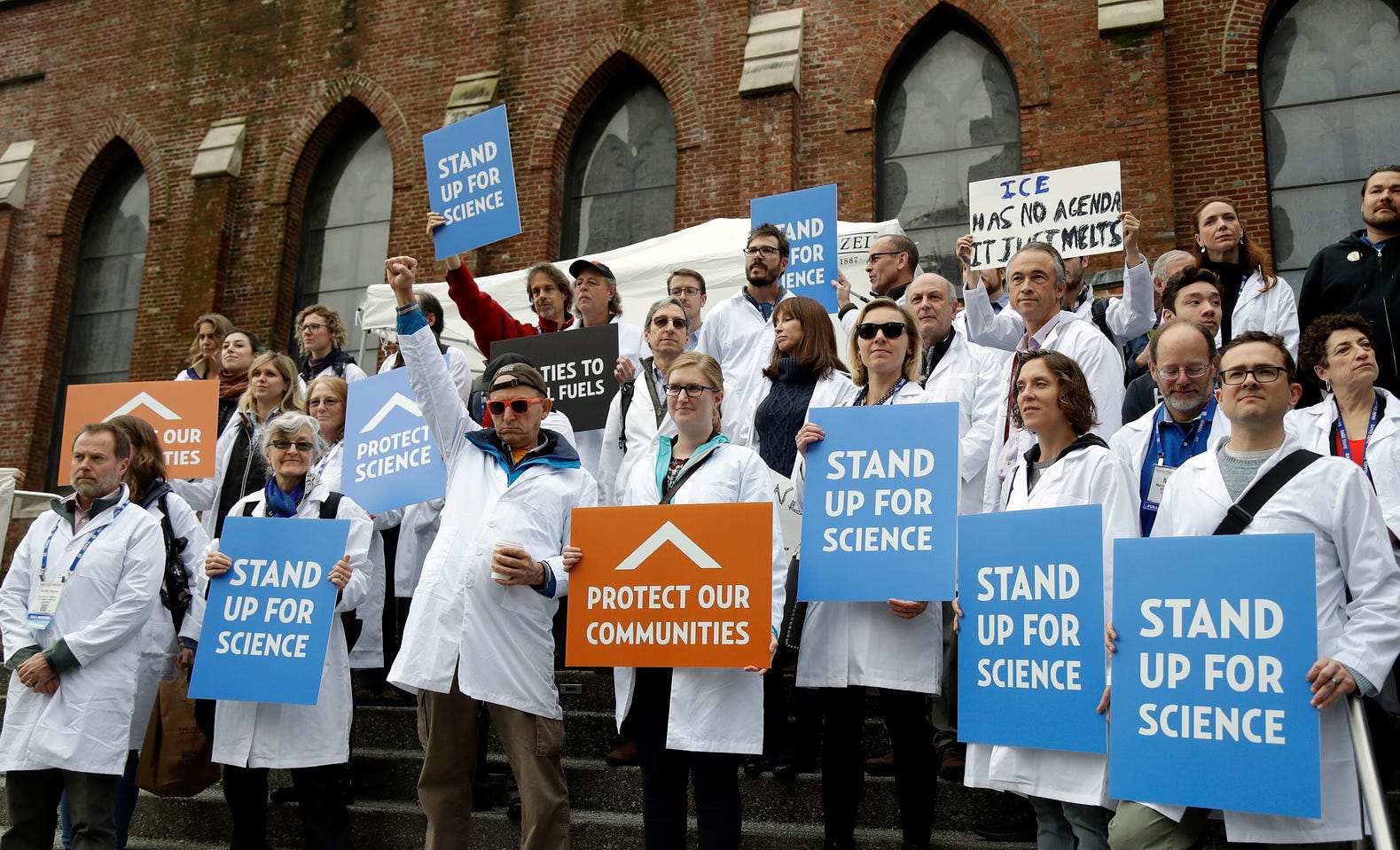SCIENTISTS EMBARK ON THEIR OWN TRUMP RESISTANCE, “ALTERNATIVE FACTS” DON’T REALLY WORK FOR SCIENTISTS.

The Trump administration has frozen EPA grants, barred USDA scientists from publishing research (a policy that was reversed), and taken down a slew of climate information on the White House website — all in its first week. The president himself has repeatedly questioned climate change and said he will defund clean energy research.
Scientists have withstood years of climate denial from politicians, but the threats posed by the Trump administration appear so severe that the scientific community has been galvanized into its own resistance movement.
Since late last year, scientists have been at the forefront of an ongoing effort to archive government climate data considered at risk from the new administration. A new effort to encourage scientists to run for elected office has emerged, and a march on Washington in the name of evidence-based science is in the works.
“It’s clear that the new administration’s attacks on the independence of government scientists have struck a nerve,” Michael Halperin, deputy director of the Center for Science and Democracy at the Union of Concerned Scientists, told ThinkProgress. “Scientists know that reliance on ‘alternative facts’ harms public health and the environment, and are mobilized and energized to ensure that government policy is based on real information.”
The work scientists do has a direct impact on human health. In fact, that group of society may be the best-positioned to know exactly how important research is. Stopping or ignoring science has serious repercussions.
“Scientists increasingly see the immediate connection between their research and policies that protect our environment and save lives, and are willing to speak up against attempts to undermine their work,” he said. “Since the election, they have signed statements, called Congress, organized events, and even prepared to run for office. Given the threats from the Trump administration on the scientific enterprise, it’s not surprising that they’re ready to take to the streets.”
They seem to have a lot of supporters, as well.
The Twitter account @ScienceMarchDC has exploded since it launched Monday. As of Wednesday afternoon, the account had 30,000 followers. More than 180,000 people have joined a Facebook event for the march, even though a date has not yet been set. Organizers say they are waiting until they have finalized more details to speak with the media.
“The march is non-partisan, but it is absolutely intended to have an impact on policy makers,” according to the group’s FAQ page. Anyone is welcome to march who supports empirical science.
“An American government that ignores science to pursue ideological agendas endangers the world,” the site says.
In fact, Congress — and now the White House — is dramatically less accepting of science than the American public at large. Most Americans, some 65 percent, according to a Gallup poll conducted last year, accept the scientific consensus that global warming is real and human caused.
On the other hand, most of the country is represented by someone in Congress who does not accept that fact.
Climate denial has been a point of contention between politicians and scientists for years. The chair of the House Science, Technology, and Space Committee, for instance, is an avowed climate denier. But it seems that politicians — led by President Trump — have gone too far. Scientific American’s editors wrote back in September that his policies were “authoritarian” and that his campaign “takes antiscience to previously unexplored terrain.” The reality since he took office has not deviated from that pattern.
And Americans don’t want an antiscience president, it seems.
“The overwhelming interest in a scientist march shows that facts still matter to people, and that efforts to erode the role of science in our democracy will be met with direct resistance,” Halperin said.
Resistance works. Earlier this month, the House attempted to roll back ethics rules; representatives’ offices were flooded with calls, and lawmakers called off the plan.
Then, Tuesday, it was reported that the Environmental Protection Agency — which is already under a gag order — has been directed to remove any climate information from its website. That action, too, prompted a massive outcry, and the administration has reportedly changed course, at least delaying the information blackout. A spokesman for the EPA transition said that they were only planning on “scrubbing it a little bit.”
Doug Ericksen, a Republican state senator in Washington, told The Hill, “We’re looking at scrubbing it up a bit, putting a little freshener on it, and getting it back up to the public.”
It’s worth reiterating here that this information is critically important. Climate change poses one of the greatest risks to human health in the history of mankind. Military advisers say it is a massive security risk. Doctors worry about the rise and spread of disease. Farmers are facing uncertain crop futures, and coastal cities are dealing with encroaching seawater.
These issues all need to be faced head on, by policymakers. So at the Women’s March last Saturday, when organizers called for more people to run for office, some scientists took that call to heart.
“A lot of scientists traditionally feel that science is above politics but we’re seeing that politics is not above getting involved in science,” Shaughnessy Naughton, founder of 314 Action, a recently formed group that supports scientists running for office, told The Atlantic,.
“We’re losing, and the only way to stop that is to get more people with scientific backgrounds at the table,” she said.







Follow Us!